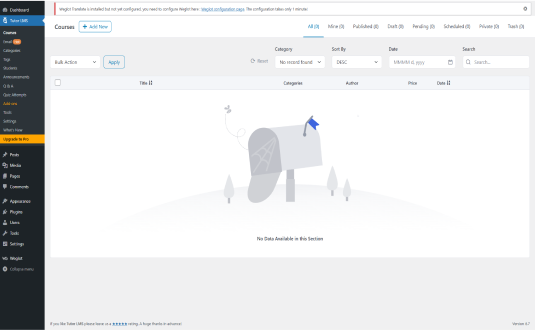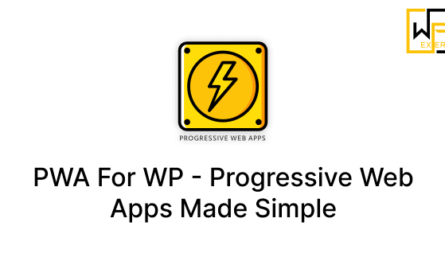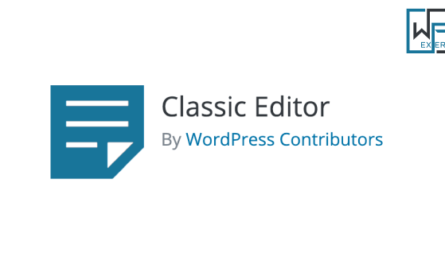Tutor LMS is a feature-rich Learning Management System (LMS) plugin for WordPress, designed to transform WordPress websites into robust eLearning platforms. Tutor LMS allows users to create, manage, and sell online courses directly from their WordPress site, making it an ideal choice for educators, institutions, and entrepreneurs who want to deliver online courses efficiently. Here’s a comprehensive look at Tutor LMS, its features, advantages, customization options, and pricing.

1. Overview of Tutor LMS Plugin
Tutor LMS is developed by Themeum, a company known for creating WordPress tools. This plugin offers all the necessary tools to create a full-featured online learning platform, handling course creation, user management, assessments, grading, and more. Its user-friendly interface and drag-and-drop course builder make it accessible to educators who may not have extensive technical knowledge, while its robust features cater to complex course structures and business models.
2. Key Features of Tutor LMS
- Intuitive Course Builder: Tutor LMS’s drag-and-drop course builder is a standout feature, allowing users to create courses without any coding knowledge. Instructors can structure courses with lessons, quizzes, and assignments using this visual interface.
- Unlimited Course Creation: Users can create an unlimited number of courses with any number of lessons and topics. Each course page can contain various multimedia content, including videos, images, and documents, to support diverse learning styles.
- Advanced Quiz Creator: Tutor LMS offers a powerful quiz builder that lets instructors create quizzes with multiple question types, such as multiple-choice, true/false, fill-in-the-blank, and more. Quiz timing, randomization, and grading options allow instructors to customize assessments for specific courses.
- Lesson Management: Courses can be divided into manageable lessons or modules, which are helpful for creating a structured learning experience. Lessons support text, video, and multimedia files, allowing instructors to incorporate varied educational content.
- Student Management: The plugin provides tools for managing student enrollment, tracking progress, and sending notifications. Educators can communicate with students directly from the dashboard, making it easy to follow up on assignments or answer questions.
- Monetization Options: Tutor LMS has several monetization features, allowing course creators to sell courses individually, offer course bundles, or create membership-based learning plans. It integrates with WooCommerce and Easy Digital Downloads for secure and flexible payment processing.
- Reports and Analytics: For course administrators, Tutor LMS offers comprehensive analytics, including reports on course sales, student enrollment, and quiz performance. These insights allow educators to track and improve course effectiveness.
- Frontend Course Builder: For platforms with multiple instructors, the frontend course builder lets instructors create and manage their courses without accessing the backend. This feature is particularly useful for institutions or websites with numerous content creators.
- Content Drip and Prerequisites: Content drip functionality lets instructors schedule content to be released over time, encouraging continuous engagement and preventing students from rushing through courses. Prerequisite options allow administrators to require students to complete certain lessons or courses before accessing more advanced material.
- Certificate Generation: Tutor LMS supports custom certificates, which are automatically awarded to students upon course completion. Certificate templates are customizable, allowing course creators to match their brand.
- Gamification: With features like points, badges, and rewards, Tutor LMS promotes engagement and motivation. Students earn badges and certificates, making learning more engaging.
- Multimedia Support: The plugin supports embedding videos from platforms like YouTube, Vimeo, and self-hosted videos. This flexibility enables educators to deliver high-quality visual content and enrich the learning experience.
- Assignments and Grading: Instructors can assign tasks to students and review their submissions within the platform. The grading system allows for automatic or manual grading options, providing flexibility for different assessment styles.
3. Tutor LMS for Instructors and Students
- For Instructors: Tutor LMS provides tools for instructors to create, manage, and assess courses independently. They have access to analytics, which gives insights into student performance and course engagement. With frontend course creation, instructors have a streamlined process for managing their courses without backend complexity.
- For Students: Students enjoy a user-friendly interface with a personalized dashboard where they can track their enrolled courses, review assignments, and monitor progress. With access to course materials and the ability to communicate with instructors, Tutor LMS enhances the online learning experience.
4. Integration with WordPress Ecosystem
Tutor LMS integrates smoothly with WordPress themes, including most eLearning and multipurpose themes. It works well with page builders like Elementor, allowing users to design customized course pages with ease. Additionally, Tutor LMS integrates with WooCommerce and Easy Digital Downloads for eCommerce functionality, making it easy to sell courses directly through the website.
5. Monetization Options with Tutor LMS
- WooCommerce Integration: With WooCommerce, users can manage payments, offer course bundles, and even create a subscription model for regular income. WooCommerce’s flexibility allows for discount codes, coupons, and affiliate programs.
- Membership and Subscription Options: Tutor LMS supports membership models that let site owners restrict access to certain content. This approach allows for more stable revenue by charging students on a recurring basis.
- Single Course Purchases and Course Bundles: Site owners can offer courses as one-time purchases or in packages. This flexibility lets users design various pricing models to meet student needs.
6. Customization and Flexibility
Tutor LMS provides various customization options that allow users to tailor their eLearning platform to specific branding or functional requirements:
- Customizable Templates: Users can customize course and quiz templates or use Elementor to design unique pages for each course.
- Certificate Customization: The certificate generator in Tutor LMS offers several templates that can be personalized to align with branding and professional standards.
- Flexible Assessment Options: Instructors can set up unique quizzes and assignments, providing custom grading options for diverse student needs.
- Language Support: Tutor LMS supports multilingual sites and integrates with popular translation plugins, making it suitable for eLearning platforms that serve a global audience.
7. Pricing and Plans
Tutor LMS offers both free and premium versions, giving users flexibility to choose based on their needs.
- Free Version: The free version of Tutor LMS offers essential features like course building, student management, and basic quizzes. It’s suitable for those who want to set up a small-scale eLearning platform or test the plugin’s functionality before upgrading.
- Pro Version: The Pro version includes advanced features such as content drip, prerequisite management, certificates, advanced quizzes, and detailed reports. Pro pricing is tiered based on the number of sites:
- Single Site License: Ideal for individual educators or small businesses with one website.
- 5-Site License: Suitable for small to medium businesses managing multiple eLearning sites.
- Unlimited License: Provides flexibility for agencies or large institutions managing multiple websites.
8. SEO and Performance
Tutor LMS is built with SEO in mind, ensuring courses and lessons are indexed properly by search engines. The plugin is optimized for performance, ensuring it does not significantly impact site speed. Tutor LMS also supports caching plugins to improve loading times, essential for maintaining a positive user experience.
9. Benefits of Using Tutor LMS
- Ease of Use: Tutor LMS is accessible for users of all experience levels. Its drag-and-drop builder, frontend course creation, and intuitive dashboard make it easy to create and manage courses.
- Scalability: Tutor LMS is suitable for both small and large eLearning sites. Its flexibility allows it to grow with your platform, accommodating more instructors, students, and course offerings.
- Student Engagement: Gamification, certificates, and flexible assessments promote higher engagement and motivate students to complete their courses.
- Secure Payments: Tutor LMS’s integration with WooCommerce ensures secure and reliable payment processing, giving students confidence in the platform.
- Excellent Customer Support: Themeum provides dedicated support for Tutor LMS, along with tutorials and documentation to help users maximize the plugin’s capabilities.
10. Drawbacks of Tutor LMS
- Limited Functionality in Free Version: While the free version provides essential LMS features, it lacks advanced options like content drip, which are often necessary for structured courses.
- Cost for Premium Features: While the Pro version offers advanced features, it may be expensive for small businesses or solo educators with limited budgets.
- Dependent on WooCommerce for Monetization: For those who wish to sell courses, WooCommerce integration is often required, adding complexity for users who aren’t familiar with it.
11. Conclusion
Tutor LMS is a comprehensive and flexible LMS plugin for WordPress, ideal for creating an online learning platform. With features like advanced quizzes, student management, frontend course building, and WooCommerce integration, Tutor LMS provides everything needed to create, manage, and sell online courses. While the free version is a great start for beginners, the Pro version’s additional features make it a powerful tool for serious eLearning entrepreneurs and institutions.




